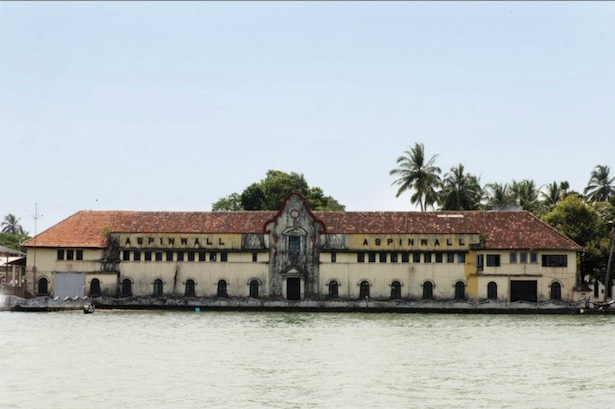http://www.kochimuzirisbiennale.org/
Kochi-Muziris Biennale

Aspinwall House, Fort Kochi. 160,000 sq ft of exhibition and event space for Kochi-Muziris Biennale 2012.
Kochi-Muziris
Biennale 2012
12 December, 2012–13 March, 2013
Press and professional preview: 11 December, noon
Aspinwall House, Fort Kochi, Kerala, India
Aspinwall House, Fort Kochi, Kerala, India
Venues in Fort Kochi, Mattancherry,
Ernakulam town and Muziris heritage sites
Ernakulam town and Muziris heritage sites
India’s first biennale, Kochi-Muziris Biennale, will open in 30 days. The three-month-long exhibition and cultural programme, the largest contemporary art event in the country, will take place across a string of venues in the Fort Kochi area.
Curated by co-founders and artists Bose Krishnamachari and Riyas Komu, the first edition of Kochi-Muziris Biennale has nearly 90 artists participating, the large majority of whom are creating new, site-specific works. Half of the artists are Indian, a good number of them from Kerala.
Kochi-Muziris Biennale 2012 will be inaugurated on 12.12.12 at Parade Ground in Fort Kochi.
Kochi Muziris Biennale explores the possibilities of blurring the boundaries, in a geographical region where boundaries are blurred in a local and cosmopolitan way, where the surroundings offer inspiration by way of the character of the place one can exhibit in. It can generate response to something that is already there as a public space in the neighborhoods, where perceived political content has been a major determinant of what survives and of what gets created as art in the first place.
Critical imagery can only have its genesis in a shared space, where celebrations of ethnicity or historical themes can collapse into metonymic utterances that cancel the distinctions between places and boundaries, aesthetics and politics, between life and art.
It is against this backdrop of an earnest enquiry that we propose to make Kochi a repository of emerging ideas and ideologies, an occasion to explore a mechanism to process, reflect and rewrite history, different histories, local, individual and collective that would meet in confluence in Kochi. The Kochi-Muziris Biennale proposes to open a new discourse, one that will explore a new, hitherto unknown language of narration.
Artists working on new commissions for the biennale include Sudarshan Shetty (India), Sanchayan Ghosh (India), Subodh Gupta (India), Hossein Valamanesh (Iran/Australia), Ariel Hassan(Argentina), Amanullah Mojadidi (Afghanistan), Anita Dube (India), Jyothi Basu (India), Tallur LN(India), Vivan Sundaram (India), Sheela Gowda (India), Joseph Semah (Netherlands), Nalini Malani (India), Atul Dodiya (India), UBIK (Dubai), Rigo 23 (Portugal), Jonas Staal (Netherlands),Dylan Martorell (Scotland/Australia), Ernesto Neto (Brazil), Reghunathan (India), PS Jalaja (India) and Mathangi Arulpragasam (M.I.A.) (UK).
The biennale will present an eclectic programme of talks, seminars, screenings, music, workshops and educational activities for students of all ages.
Biennial Foundation and Kochi Biennale Foundation are co-hosting a symposium on emerging platforms for contemporary art in India December 15–16. The two-day programme includes speakersGeeta Kapur, Sarat Maharaj, Ranjit Hoskote, Gayatri Sinha, Pooja Sood and Nancy Adajania.
‘Let’s Talk,’ Kochi-Muziris Biennale’s daily programme of talks, presentations, performances, conversations and panel discussions featuring artists, academics, curators and critics, will be held at the Outset Carnoustie Pavilion.
A literary/cultural festival, Annual Rings, will be launched on November 12 during an international book festival held at Ernakulam town by DC Books.
The BRICS Project, a collateral exhibition curated by Alfons Hug, director of the Goethe-Institute in Rio de Janeiro, Brazil, features artists from Brazil, Russia, India, China and South Africa, and Germany.
Ten international films selected by renowned film maker Adoor Gopalakrishnan will be screened as a special programme at the biennale.
Kochi-Muziris Biennale 2012 venues include the 150-year-old Durbar Hall in downtown Kochi, recently renovated by the Kochi Biennale Foundation, and David Hall, a restored Dutch bungalow in Fort Kochi. Spice warehouses, heritage structures, theatres, halls and public spaces are also on the map of this city-wide festival of art.
Aspinwall House is a large sea-facing heritage property at Fort Kochi, which contains a wide variety of structures, including offices, warehouses and a residential bungalow totalling 160,000 square feet of exhibition and event space. Aspinwall House, which will be a primary venue for the biennale, has been loaned to Kochi-Muziris Biennale by DLF Limited in association with the Gujral Foundation.
Pepper House is a historic spice godown with Dutch-style clay roofs and a large courtyard, once used to store goods for loading onto ships anchored in Kochi harbour. Pepper House provides Kochi-Muziris Biennale with 16,000 square feet of exhibition space and artist residency studios.
These grand heritage properties located on the Kochi harbour waterfront have never been open to the public.
Kochi-Muziris Biennale 2012 opening week programme and images are available at ww.kochimuzirisbiennale.org.
Press are invited to apply for accreditation online.
Press Contacts
Maya Menon, Communications and Marketing Assistant
T +91 8943 598 524 / maya@kochimuzirisbiennale.org
Michelangelo Bendandi, Director of Communications
T +91 9562 905 508 / michelangelo@kochimuzirisbiennale.org
Maya Menon, Communications and Marketing Assistant
T +91 8943 598 524 / maya@kochimuzirisbiennale.org
Michelangelo Bendandi, Director of Communications
T +91 9562 905 508 / michelangelo@kochimuzirisbiennale.org
images from initial site visit here:
soundtracksingdonesia.blogspot.com



No comments:
Post a Comment